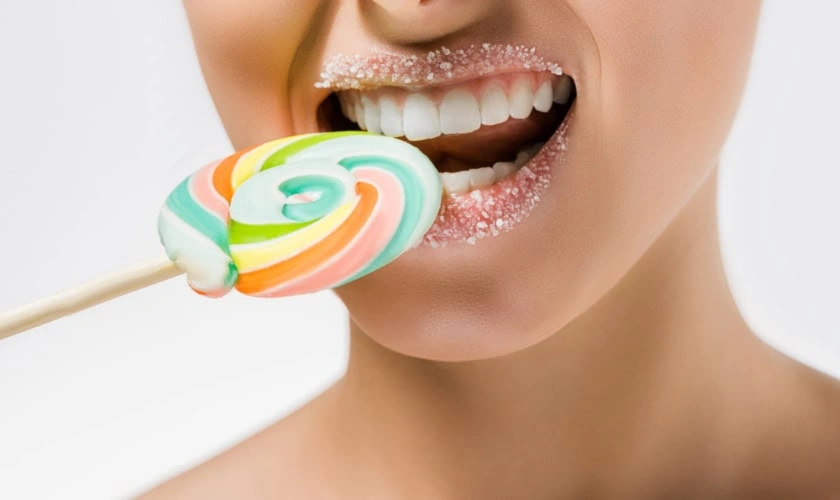
We all know sugar makes things taste delicious, but what about its impact on our health, especially our teeth? Sugar might be our taste buds’ best friend, but it’s our teeth’s worst nightmare. Let’s delve into the science behind sugar and understand how it wreaks havoc on our oral health.
What is Sugar and How Does it Work in Our Body?
Sugar is a simple carbohydrate, providing readily available energy for our bodies. There are two main types of sugars:
- Natural Sugars: These are found naturally in fruits, vegetables, and dairy products. These sugars are usually accompanied by fiber and other nutrients that help regulate their absorption.
- Added Sugars: Ingredients like table sugar, high fructose corn syrup, and honey that manufacturers add to processed foods and beverages. These are the culprits we need to be mindful of.
When we consume sugar, our bodies break it down into glucose, which enters the bloodstream and fuels our cells. However, excessive sugar intake can lead to blood sugar spikes and crashes, impacting our energy levels and overall health.
How Sugar Affects Your Oral Health
Here’s where things get scary for our teeth. Sugar isn’t just about cavities; it can wreak havoc on your entire mouth. Let’s explore how:
- The Sugar-Acid Attack: When we eat sugary foods, bacteria in our mouth feast on the sugar, producing acid as a byproduct. This acid erodes tooth enamel, the hard outer layer protecting our teeth. Over time, this erosion weakens the enamel, making teeth susceptible to cavities.
- Plaque Party: Sugar creates a breeding ground for harmful bacteria in the mouth. These bacteria thrive on sugar and clump together to form plaque, a sticky film that coats teeth. Plaque not only harbors more cavity-causing bacteria, but it can also harden into tartar (calculus) if not removed through proper brushing and flossing. Tartar is even more difficult to remove and requires professional dental cleaning.
- Gum Disease Gateway: Excessive sugar consumption can contribute to gum disease (gingivitis and periodontitis). The constant inflammation caused by plaque buildup can irritate and damage gum tissue, leading to bleeding gums, receding gums, and even tooth loss in severe cases.
- Oral Thrush: The imbalance of bacteria caused by sugar can also lead to oral thrush, a fungal infection that manifests as white patches on the tongue and inner cheeks.
While occasional sugary treats won’t cause immediate damage, consistently indulging in a high-sugar diet can have significant consequences for your oral health. Brushing and flossing regularly are important, but understanding the enemy (sugar) is the first step towards a healthy smile.
Hidden Sugars: Where They Lurk and How to Spot Them
Sugar isn’t always as obvious as the spoonful you add to your coffee. The food industry cleverly hides added sugars in many everyday products, making it challenging to maintain a low-sugar diet. This section equips you to be a sugar detective!
Understanding Food Labels: Deciphering Sugar Content
Food labels are packed with information, but deciphering sugar content can be tricky. Here’s what you need to know:
- Know Your Sugar Names: Added sugars can go by many names on food labels. Look out for terms like sucrose, high fructose corn syrup, dextrose, maltose, honey, agave nectar, and concentrated fruit juice.
- Daily Sugar Intake Guidelines: The World Health Organization (WHO) recommends limiting added sugar intake to less than 10% of your daily calorie intake, ideally aiming for less than 5%.
- Beware of Deceptive Serving Sizes: Pay close attention to serving sizes listed on food labels. A seemingly healthy product might have a high sugar content if the serving size is deceptively small.
Here’s a helpful tip: Use the sugar content per serving listed on the label to calculate the percentage of your daily recommended intake that a single serving represents.
Sneaky Sugar Sources in Everyday Foods
Sugar lurks in many seemingly healthy foods. Here are some common culprits:
- Condiments: Ketchup, salad dressings, barbecue sauce, and even some marinades can be loaded with added sugars.
- Drinks: Sugary sodas, sports drinks, fruit juices (even those labeled “100% juice”), and flavored coffees are major sugar culprits. Opt for water, unsweetened tea, or black coffee instead.
- Breakfast Cereals: Many popular breakfast cereals are packed with sugar. Look for cereals with whole grains as the first ingredient and low sugar content.
- Yogurt: While yogurt offers probiotics, flavored varieties are often loaded with added sugars. Choose plain yogurt and sweeten it with fruit or a sprinkle of honey.
- Processed Snacks: Granola bars, energy bars, protein bars, and even some seemingly healthy trail mixes can be surprisingly high in sugar. Read labels carefully and choose options with minimal added sugar.
Sugar Alternatives: Friend or Foe?
With all the negativity surrounding sugar, it’s natural to seek alternatives. But are artificial sweeteners and sugar alcohols the answer? Let’s explore the science behind these popular sugar substitutes.
Exploring Artificial Sweeteners: Safety and Potential Benefits
Artificial sweeteners are lab-created sugar substitutes that offer a very sweet taste with minimal to no calories. Some common artificial sweeteners include:
- Aspartame
- Sucralose
- Saccharin
- Acesulfame K
There’s been ongoing debate about the safety of artificial sweeteners. Extensive research conducted by reputable health organizations like the FDA has concluded that artificial sweeteners are safe for consumption in moderate amounts when used within the recommended daily intake (ADI) limits set for each sweetener.
While artificial sweeteners don’t contribute to tooth decay like sugar, some studies suggest they might alter gut bacteria, potentially impacting overall health. More research is ongoing in this area.
Important Note: If you have a specific medical condition like phenylketonuria (PKU), it’s crucial to consult your Grapevine dentist before consuming aspartame, as your body cannot properly metabolize it.
Sugar Alcohols: A Natural Alternative or Cause for Concern?
Sugar alcohols are naturally occurring or man-made sweeteners with a sugar-like taste but fewer calories than sugar. Some common sugar alcohols include:
- Xylitol
- Sorbitol
- Mannitol
Sugar alcohols have a minimal impact on blood sugar levels and may not cause cavities like sugar. However, there are some things to consider:
- Xylitol: Stands out as a potential dental health hero. Research suggests it can actually reduce harmful bacteria in the mouth and may even prevent cavities.
- Sorbitol and Mannitol: In large quantities, these sugar alcohols can cause digestive discomfort like bloating and gas. Be mindful of serving sizes when consuming products containing these sugar alcohols.
Choosing the Right Sweetener:
Both artificial sweeteners and sugar alcohols can be reasonable alternatives to sugar, but it’s important to be mindful of potential drawbacks and consume them in moderation. Here are some additional tips:
- Look for products sweetened with a blend of sweeteners to minimize the potential downsides of any single ingredient.
- When possible, opt for natural sweeteners like stevia leaf extract, which comes with its own set of benefits but may have a slightly different taste profile.
Remember, moderation is key. While these alternatives can be helpful in reducing sugar intake, they shouldn’t be a free pass to indulge in excessive amounts of sweetened products.
Prevention is Key: Strategies to Fight Sugar’s Impact
Sugar might be tempting, but there are effective strategies you can implement to minimize its impact on your oral health. This section equips you with a battle plan to fight sugar and protect your smile.
Maintaining a Healthy Oral Care Routine
The foundation of good oral health lies in a consistent oral care routine. Here are some key practices:
- Brushing: Brush your teeth twice a day for two minutes with fluoride toothpaste. Focus on brushing the surfaces of your teeth, the gum line, and your tongue.
- Flossing: Flossing at least once a day is crucial for removing plaque and food particles between teeth, where brushing can’t reach.
- Regular Dental Checkups and Cleanings: Schedule regular dental checkups and cleanings with your Grapevine dentist, typically every six months. Professional cleanings remove plaque buildup, and tartar that brushing and flossing alone cannot tackle. Your dentist in Grapevine can also identify and address any potential oral health concerns early on.
Dietary Habits to Minimize Sugar Intake
A balanced diet plays a vital role in maintaining good oral health. Here are some tips to minimize sugar intake:
- Limit Sugary Drinks: Swap sugary sodas, juices, and sports drinks for water, unsweetened tea, or black coffee.
- Be Mindful of Added Sugars: Read food labels carefully and choose products with lower sugar content. Opt for whole foods over processed options whenever possible.
- Choose Healthy Snacks: Snack on fruits, vegetables, nuts, or yogurt with minimal added sugar instead of sugary treats.
- Sweeten Wisely: If you need to sweeten your food or drinks, consider natural options like stevia leaf extract or a small amount of honey.
Remember, small changes in your diet can make a significant difference in your oral health. By making conscious choices and incorporating these tips into your routine, you can significantly reduce sugar’s negative impact on your smile.
Final Words
Sugar may add sweetness to our lives, but it can wreak havoc on our oral health. This comprehensive guide has explored the science behind sugar’s impact on your teeth, unveiled hidden sugar sources, and provided strategies to minimize its effects.
Remember, you have the power to make informed choices about your diet and oral hygiene routine. By incorporating the tips and strategies outlined in this article, you can significantly reduce sugar’s negative influence on your smile. Maintain a balanced diet, prioritize good oral care practices, and schedule regular dental checkups to ensure a lifetime of healthy teeth and a confident smile.
Frequently Asked Questions
Is artificial sweetener better than sugar for my teeth?
Artificial sweeteners don’t directly cause cavities like sugar. However, the research on their long-term impact on oral health is ongoing. Moderation is key, and consuming them within the recommended daily intake limits is crucial. For optimal oral health, a balanced diet with minimal added sugar is still recommended.
Can sugar cause cavities in adults?
Absolutely. While cavities are often associated with childhood, adults are just as susceptible. Sugar consumption can erode tooth enamel and lead to cavities at any age. Consistent oral hygiene practices and limiting sugar intake are essential for adults to maintain healthy teeth.
Does sugar cause bad breath?
Yes, indirectly. The bacteria in your mouth that feed on sugar produce acids and byproducts that contribute to bad breath (halitosis). Maintaining good oral hygiene and reducing sugar intake can help combat bad breath.



